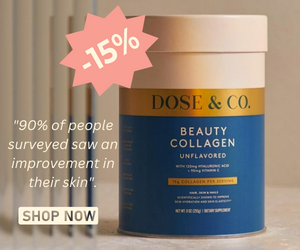If you don’t already know about collagen, you should take some time to get yourself acquainted. The benefits of collagen are something you should know about. Simple!
I want to share with you why.
What is Collagen?
Collagen is a naturally occurring ‘protein’ that is found in abundance in the body. It is in your bones, tendons, muscles and skin. Collagen is often called the body’s scaffolding. It is the glue that holds your body together providing strength and structure. Healthy levels of collagen help your skin stay soft and supple keeping wrinkles at bay, strengthening nails and hair. It also can help your bones function with ease and mobility stopping the aching, creaking and pain; and it also helps support a healthy heart, improve gut health, as well as boost your brain health too.
Great! The bad news? As we age, your levels of collagen start to decline. At around age 35, your levels of collagen production start to slow down drop and visible signs of ageing appear and the body can experience many negative side effects. Come age 40, depletion of collagen increases faster than your body can make it, so by the time we hit 60, your body will have lost over half its collagen.
The good news? We can do something about it!
Collagen can be added into your daily diet to boost declining levels by introducing a collagen supplement. Although many beauty products include collagen in their formula to apply topically, I want to focus on supplementing the diet and ingesting collagen to help stave off the signs of aging and help your body navigate the many challenges it faces with the onslaught of age.
Did You Know That There are Different Types of Collagen?
There are actually 16 types of collagen that form part of your fundamental physical composition. Of these, the 5 main types include:
- Type I (benefits skin, hair and nails and also your gut lining)
- Type II (benefits joint health and immune system)
- Type III (similar to Type I)
- Type V (found in the placenta of pregnant women)
- Type X (benefits joint cartilage and disc tissues)
Which Foods Are Rich In Collagen?
There are a variety of different sources that collagen in the foods that we eat. Foods rich in collagen include:
- Spinach
- Kale
- Beetroot
- Fish
- Tomatoes
- Bone broth
- Eggs
- Beef
- Dairy
Vitamin C plays a major role in the production of collagen therefore, getting enough vitamin C is also critical in ensuring proper absorption of collagen.
A good source of vitamin C includes citrus fruits like oranges, grapefruit, lemons, and limes. Vitamin C needs to be taken daily as the body is unable to store it.
Supplementing Collagen: The Most Effective Source

As Well as dietary sources, collagen can be added to the body in a supplementary powder or pill form.
Dietary sources for powdered or pill collagen supplements are derived from Bovine, Poultry and Marine, each providing different types of collagen. Many people believe in covering all bases and taking a supplement that contains all types however, this could reduce the dosage or potency if you need just a specific type. Do your homework first and make sure that the supplement you choose will bring the health benefits that you want. Just so you know, the most common are Type I and III.
Collagen Supplements – Porcine, Bovine, Poultry Or Marine?
Bovine collagen contains type I and III collagen, and is great for your skin and bones.
Poultry collagen is loaded with type II collagen (in addition to glucosamine, chondroitin, and hyaluronic acid) which means that this is ideal for maintaining and improving joint health.
Type V and X can be sourced from eggshell membranes.
Marine collagen is typically extracted from wild-caught fish and is mainly composed of type I collagen, but it also has some type III which are both great for your skin and bones.
As a side note, some studies have shown that marine collagen is absorbed 1.5 times faster than any for of collagen so you may want to consider this as your first option.
What Does Hydrolyzed Collagen Mean?
When you start searching for collagen, you’ll notice that many collagen supplements are labelled as ‘hydrolyzed’ which simply means that the collagne has been broken down into their smaller form—called ‘peptides’—which is easier for the body to absorb.
Can You Take Too Much Collagen?
As with all things, too much is never a good thing so be sure to find a product that is going to provide a healthy daily serving. Research suggests that between 2.5gr – 12 gr seems to be a healthy, effective daily serving. Generally, it is easier to get a higher daily serving using powders versus capsules, but check the product labels to be sure.
It is important to follow the instructions because human behaviour thinks that the more we take the quicker you will see results. This is not true. The body will expel what it doesn’t use and taking too much collagen can give you stomach ache.
If you follow the instructions, be patient and consistent, within a few weeks you WILL start to see results.
How Do I Get My Collagen Boost?
For me, taking collagen is super easy. I buy the powder and I put it in my coffee! It is a fabulous source of protein, with 10 grams per serving, it’s tasteless and the benefits are beyond skin deep!



